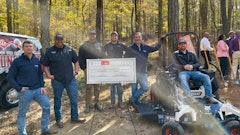The most successful landscape companies—we’re talking about the ones that grow to be multi-million dollar firms with more awards and accolades than their office walls can hold—have a plan to make their employees as smart as they can be. They also have a plan to capitalize on what Mike Rorie likes to call “successful intelligence,” which means you focus on strengths while neutralizing weaknesses.
Rorie is one of the most successful landscape contractors of the last 20 years in the Green Industry. He sold his $30 million-plus company, GroundsMasters in Cincinnati, to The Brickman Group in November 2006. Today Rorie is CEO of GIS Dynamics (Go iLawn).
Rorie was a featured speaker at the JP Horizons “A Better Way” Reunion Jam in New Orleans March 5-6, 2010. He outlined a series of “production success factors” that landscape contractors must take into account if they want to prosper in the new economy.
Production
Clearly defined markets and services are a must. “Your employees, customers, vendors and competitors should all be able to describe who you are and what you do,” Rorie says.
Great estimating … proper equipment … highly trained foremen … a sound job costing system … a clear strategic plan … these are all key production success factors.
Administration
Do not forget the primary reason you’ve added administrative support personnel to your company: to make things easier and more user-friendly for production.
Technology is important for administrative efficiency. Take advantage of industry-specific software programs that streamline budgeting, job costing, payroll, etc. The less data entry that has to be performed, the better. The smaller the amount of paper to be printed and filed, the better.
The administrative leader must have a sound understanding of all jobs within the company.
Checks and balances are indeed important, but be careful not to over-complicate things by adding unnecessary policies and procedures.
“Think about some of the most successful franchises in history,” Rorie relates. “How many had highly educated, well-paid people working at their outlets? Not many. They were successful because they took the hard stuff out; their companies run on systems.”
Sales
Clearly define your target market, service offering, scope of work and estimating process so they are clear for sales staff.
Establish a process for generating sales and leads. Quantify that process so you know what it takes to produce a sale.
Join a peer group to learn best practices that have worked for other successful landscape companies.
“Find your customers,” Rorie advises. “Nobody can hide. Everybody has an address. Everyone pays taxes. All that information is out there—so go find your target customers.”
Don’t be fooled: Hiring another salesperson does not guarantee increases sales. The other sales success factors listed above are even more important than more bodies.
Leadership
“Leaders are the least ‘growable’ group of people you have,” Rorie points out.
Make sure the leaders you choose have core characteristics. They must be capable of being selective. They must have the ability to prioritize instead of trying to do it all.
“Good managers don’t always make good leaders,” Rorie reminds. “That’s OK if you’re a big company, because you need both.”


























